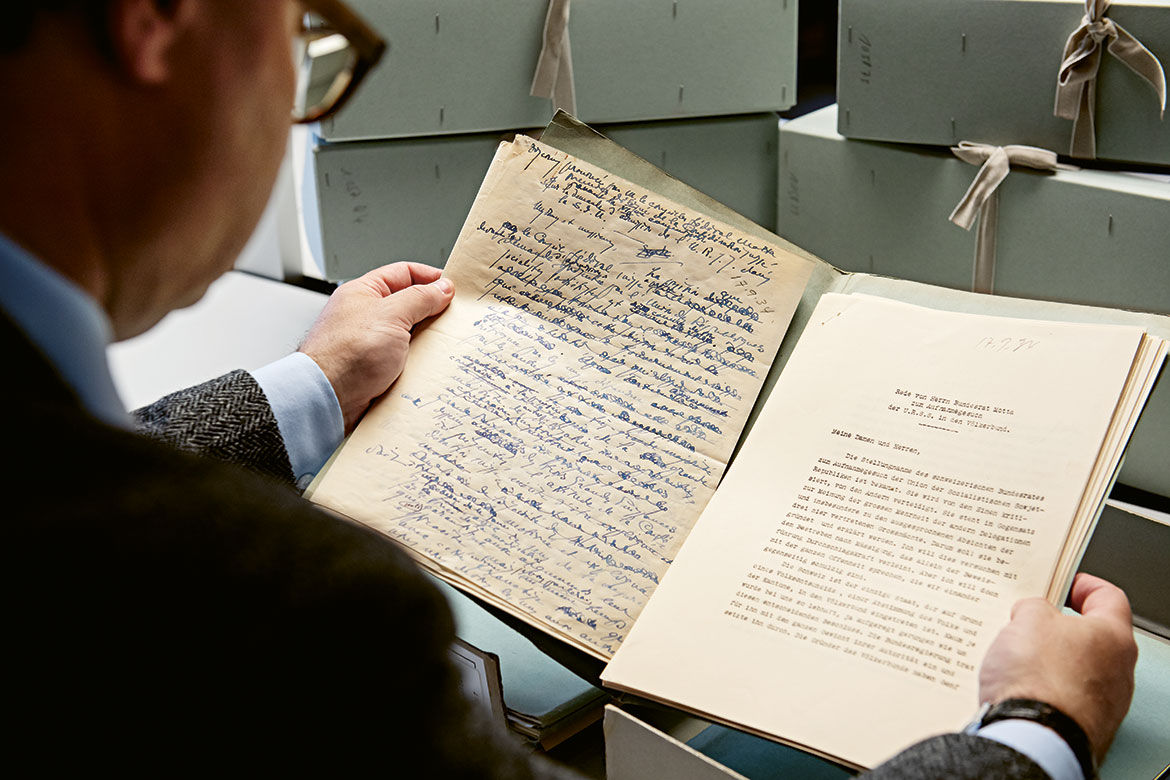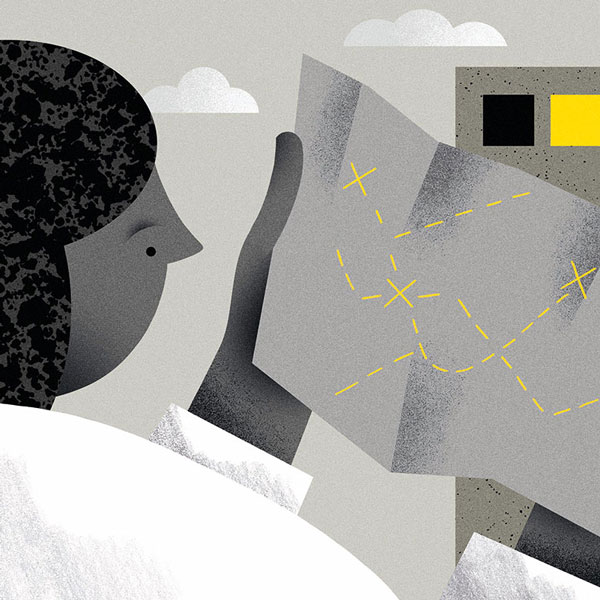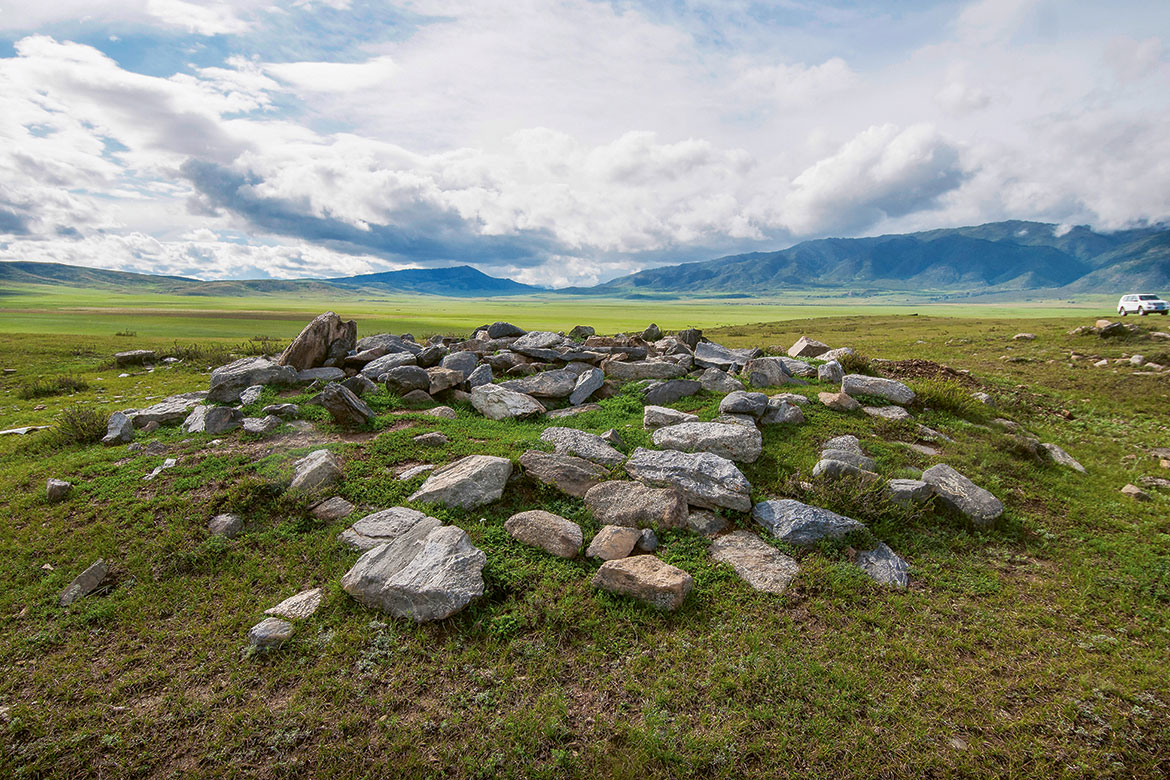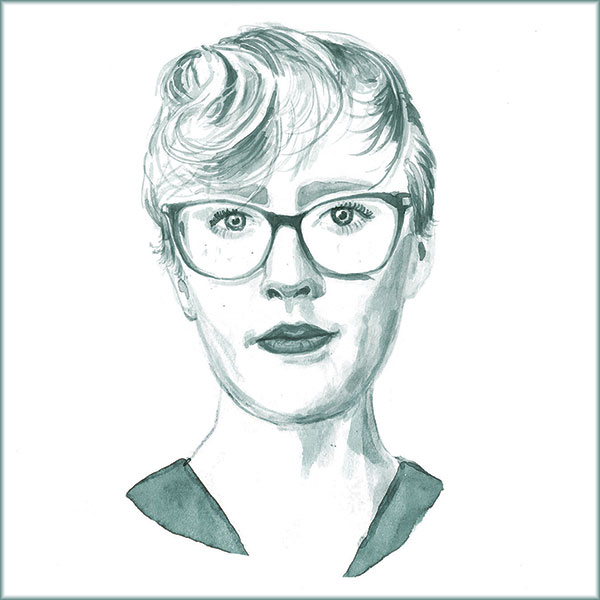Hunting for the zeitgeist in the archives
The history of the League of Nations, which was founded 100 years ago, is stored in the 66 kilometres of archival boxes that make up the Swiss Federal Archives. The Dodis database is taking the League’s centenary as an opportunity to make core documents accessible online and thereby provide a basis for new discoveries.

The incendiary speech given by Federal Councillor Giuseppe Motta, opposing the Soviet Union’s application to join the League of Nations. Historian Sacha Zala at work in the Swiss Federal Archives in Bern. | Image: Valérie Chételat
“Switzerland is the only country that joined the League of Nations on the basis of a referendum: a ballot of its people and its cantons”, declared Giuseppe Motta, a Swiss Federal Councillor from the canton of Ticino, on 17 September 1934 in Geneva. The USSR under its then premier, Molotov, certainly couldn’t make such a claim when it applied to join the League that same year. The Soviet Union’s application was the controversial item on the agenda at that meeting of 17 September. Motta was not in favour of letting the Russians join, but nor did he offer any vague excuses. As a member of the CVP, the ‘Christian Democratic People’s Party of Switzerland’, Motta eschewed all diplomatic niceties, instead openly declaring his Christian, anti-Communist beliefs. Motta’s incendiary speech entered into the annals of international relations.
Whoever would like to read all 16 pages of his speech today can do so in ‘Dodis’, the online database for Swiss diplomatic documents. It’s even available in four languages. The online French version is a facsimile of Motta’s own handwritten manuscript in blue ink. His emotionality comes through not just in his choice of words, but in their visual flow on the page. Whole sentences are rewritten, underlined or crossed out, in some cases expunged in a torrent of ink. “This communism is the most radical negation of all the ideas that are the basis of our being and on which we thrive – in matters of religion, morals, society, politics and economics …”, warned Motta.
Research into internationalism
Sacha Zala runs the Dodis Research Institute. He is interested in what Motta’s statement has to do with Swiss neutrality, and what happened to Switzerland’s much-acclaimed internationalism. ‘Dodis’ is short for ‘Documents Diplomatiques Suisses’, and it is funded by the Swiss Academy of Humanities and Social Sciences (SAHSS).
Zala is hardly going to run out of research topics, for the Federal Archives house some 66 kilometres of archival boxes. That’s roughly the distance between Bern and Olten. These boxes are full of letters, manuscripts and reports. “We sift through some two million documents every year”, explains Zala. “Of these, we publish roughly a thousandth of them as digital facsimiles – that’s 2,000 documents, along with high-quality metadata. Two hundred of these documents are also transcribed and annotated”. In the case of these 200 transcriptions, he and his researchers analyse every word and reconstruct signatures when a document only bears initials or an abbreviation for its author. The Dodis team hunts down sources, creates networks of people and organisations, and thereby discovers new connections. Sacha Zala calls his research method the ‘bunch of grapes principle’. One document is linked with a whole cluster of other online resources.
When asked to describe the nature of their basic research at Dodis, Zala says: “It’s like walking through the archives holding a candle in front of you, getting a 360-degree perspective on everything. When we make our selection, we decide which are our so-called ‘lighthouse documents’. These are core sources that reflect the zeitgeist and the nature of the epoch”. Their analyses will also help undergraduate and graduate students in future, because they will be able to base their own further research on the findings made at Dodis. Dodis is also useful for the Foreign Ministry and the Federal administration as a whole, because it enables them to get information rapidly about their own history. Journalists with an interest in politics can find relevant sources online, as can the general public. A new focus area will be placed online in the autumn of 2019, on the 100th anniversary of the founding of the League of Nations. Zala’s team is currently researching into the history of the League, using some 60 ‘lighthouse’ documents. Another 500 will be placed online at the time of the anniversary itself. “The League of Nations represented a coming together of the many international organisations that were buzzing around back then, in conjunction with a whole new degree of international connectedness on the part of Switzerland”, says Zala. He is fascinated by the international relations of the time, and how multilateralism helped to turn Geneva into a kind of ‘capital city of the world’. This autumn, he will be in Geneva to introduce the open-access publication ‘Switzerland and the construction of multilateralism’. Incidentally, the anniversary celebrations will be attended by another Federal Councillor from the canton of Ticino, the incumbent Swiss foreign minister Ignazio Cassis. But we can at least expect him to avoid anything too incendiary.




